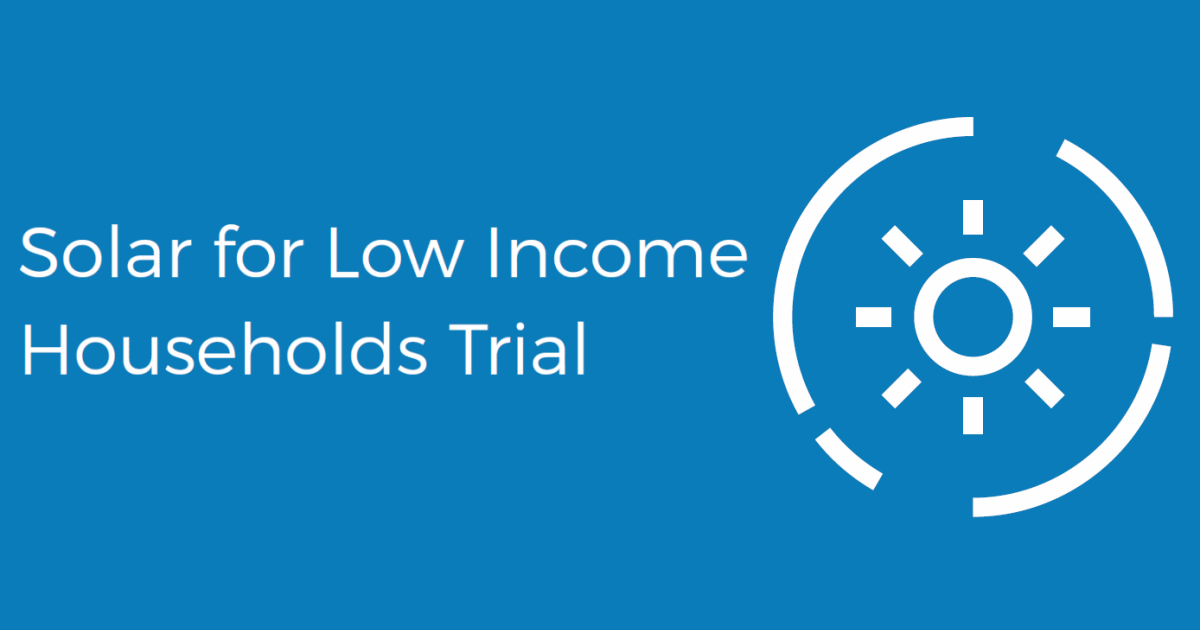The Berejiklian Government’s Solar for Low Income Households Trial, first announced last year, is now under way.
The trial involves eligible low-income households in selected regions of the state choosing to swap their Low Income Household Rebate for ten years for a solar power system.
When we mentioned the initiative just over a year ago, at that point it was to provide 3,400 households with a 2.5kW solar power system. That’s now changed to providing up to 3,000 households with a 3kW system.
Solar For Low Income Households Eligibility
The regions where the program will operate remain the same:
- Central Coast
- North Coast
- Sydney – South
- Illawarra – Shoalhaven
- South Coast
A list of eligible postcodes can be found here.
Among the other eligibility criteria, applicants must:
- hold a valid Pensioner Concession or Department of Veterans’ Affairs Gold card.
- own their home.
- not have a solar power system already installed.
- not live in a retirement village or strata building.
- use at 3,600 kilowatt- hours of electricity in a year.
The three firms supplying and installing solar energy systems for the trial are SolarHub (South Coast), SAE Group (North Coast) and Origin Energy (Central Coast, Sydney – South, Illawarra – Shoalhaven).
Households accepted under the program can choose to have a larger system installed – up to 6kW1 – but they’ll need to pay the difference. For households experiencing high power bills, if that can be afforded it is probably a wise move as bigger solar is usually better. The installation companies aren’t permitted to “upsell” to 6kW, so participants will need to specifically request a quote for a larger system.
Expected Solar Energy Savings
Participants will miss out on receiving their Low Income Household Rebate for 10 years2, which is currently a $285 annual discount on their electricity bills. However, the New South Wales Government says the average electricity bill savings from the solar systems are expected to be approximately $600 per household per year. That seems a bit conservative for a 3kW system, but it is an average and the level of savings will vary depending on installation specifics and household energy consumption profile.
Other Points To Note
Participants won’t need to change their electricity retailer, but should be aware they may be required to change contracts with their current electricity retailer in order to receive a feed-in tariff for surplus energy exported to the mains grid. A change in electricity plan may also result in a change in electricity pricing.
A smart meter will also need to be installed as part of this program. While some electricity retailers provide smart meter installations at no charge, a cost may be incurred through others.
Once the solar panels are installed, the participant will be responsible for system maintenance. Participants should also be aware they’ll need allow their electricity retailer to send a copy of their power bills to the State Government. It’s not clearly explained why, but this is probably for determining the impact of the program on electricity bills. The Department of Planning, Industry and Environment will likely use the information to help it decide whether to extend the program to other regions.
Further details on the Solar for Low Income Households Trial can be found here and the application form here. The program is open until all 3,000 systems have been allocated.


 RSS - Posts
RSS - Posts



Michael, Is it true that a solar PANEL system will not supply the house with power during a blackout situation, and si it true for a Battery backup not to supply power to house also ?????
Hi Ian, Ronald here.
A standard solar system will automatically shut down during a blackout in order to protect anyone who is working on the power lines. You can pay more for a hybrid (or multimode) inverter that can provide power to the home during a blackout, but it is difficult to power a house this way without a battery as the output solar varies through the day and clouds can cause sudden drops in output.
Whether or not a battery system will provide power to a house during a power failure depends on what type it is. Nowadays most home battery systems installed can provide power in a blackout. Finn, my boss, has a Powerwall 2 and it will change over in a blackout so rapidly he won’t even notice. Because his home doesn’t use much electricity his Powerwall can easily supply his home through the night.
Hi Michael, is the any info pertaining to why this has not been offered to anyone west of the mountains, I know that people on the coast feel the bite of power bills, but so are the people in regional NSW. I know many people out here who would jump at an opportunity like this, particularly at present with the drought putting extra strain on bills and economy out here.
Thanks,
Chris
I am a pensioner & qualify for free panel installation. However I have been advised I need 13 panels to be most economical & the NSW Govt only provides for 10 per house. Can I get the extra 3 somehow at nil cost to me?
Thanks Jonno
Hi John
While I normally recommend getting a larger system than the 3 kilowatt one this scheme offers, the good news is the 10 panels you get is still a good deal and will pay for itself and make economic sense. Unfortunately, I don’t know any way to get the system size increased.